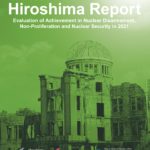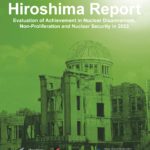Hiroshima Report 2024(13) Disarmament and Non-Proliferation Education and Cooperation with Civil Society
Increased emphasis has been placed on disarmament and non-proliferation education, as well as on the importance of diversity and inclusion, and cooperation with civil society in disarmament and non-proliferation.
In its working paper submitted to the NPT PrepCom, Japan introduced its various efforts to date regarding disarmament and non-proliferation education.273 Japan stated, “Conveying the reality of the atomic bombings to the world is the starting point of all efforts toward nuclear disarmament. With the Hibakusha, we will continue to convey the realities of nuclear weapons use beyond generations, including through our ‘Youth Leader Fund for a World without Nuclear Weapons.’”274 In addition, Japan established the “Youth Leader Fund for a World without Nuclear Weapons” in March 2023, as “a contribution by Japan to invite future leaders from both NWS and NNWS to Japan to experience the reality of the atomic bombings in Hiroshima and Nagasaki, and to create a global network of young people, including Japan, for elimination of nuclear weapons.” It contributed $10 million to the United Nations Office for Disarmament Affairs (UNODA).275 Application for the program started in May 2023,276 and the first phase of the program began in mid-December.
At the NPT PrepCom, the NPDI, South Korea, Sweden, and other countries also emphasized the importance of nuclear disarmament and nonproliferation education. In addition, Australia, Canada, Mexico, Norway, Sweden and other countries submitted a working paper, titled “Taking Forward Gender Mainstreaming Efforts in the Nuclear Non-Proliferation Treaty.”277 Other countries, mainly the Western countries, also pointed out the importance of gender issues at the NPT PrepCom.
In the Declaration, adopted at the 2MSP of the TPNW, states parties to the treaty stated, “We reaffirm the gender provisions of the Treaty and that the equal, full and effective participation of both women and men is essential in nuclear disarmament.” It was also agreed to establish a Gender Focal Point to support the implementation of the gender provisions of the Treaty during the intersessional period, following the previous meeting.
At the 2023 UNGA, the resolution “United Nations study on disarmament and non-proliferation education,” in which further promotion of disarmament and non-proliferation education as well as engagement of youth was encouraged, was adopted by consensus.278 The UNGA resolution on nuclear disarmament led by Japan stated the following on disarmament and nonproliferation education:
Calls upon all States to facilitate efforts on nuclear disarmament and non-proliferation education, which is a useful and effective means to advance the goals of the Treaty on the Non-Proliferation of Nuclear Weapons in support of achieving a world without nuclear weapons, inter alia, efforts in which the young generation can actively engage, including through dialogue platforms, mentoring, internships, fellowships, scholarships, model events and youth group activities, as well as to raise awareness of the realities of the use of nuclear weapons, including through, among others, visits by leaders, youth and others to and interactions with communities and people, including the hibakusha, those who have suffered the use of nuclear weapons irrespective of their nationalities and origins, who pass on their experiences to the future generations, and welcomes concrete measures in this regard, inter alia, the Young Professionals Network of P5 academics, the Youth4Disarmament Initiative, “Disarmament education: resources for learning” and the “Youth Leader Fund for a world without nuclear weapons.”
During the NPT PrepCom,279 the 2MSP, 280 and the UNGA First Committee281 in 2023, side events involving non-governmental organizations (NGOs) and others were held in person, some of which were hosted by participating countries. At the 2MSP of the TPNW, the participants from NGOs spoke at the sessions along with government delegations, giving a greater impression of civil society participation. (This is unlike the NPT RevCon, where NGOs are only allowed to address one specific session throughout the conference).
Regarding cooperation with civil society, one of the important efforts required from governments is to provide more information on nuclear disarmament and non-proliferation issues. Among those surveyed in this report, the following countries have set up a section or sections on disarmament and non-proliferation on their official English-language homepages and posted educational information: Australia, Austria, Canada, China, France, Germany, Japan, New Zealand, Sweden, Switzerland, the United Kingdom and the United States. In addition, the UNGA resolutions on nuclear disarmament proposed by Japan and the NAC, respectively, emphasized the importance of disarmament and non-proliferation education.
Finally, a few countries started to legislate for “divestment” from organizations or companies involved in producing nuclear weapons. On the other hand, according to the International Campaign to Abolish Nuclear Weapons (ICAN) annual report published in June 2023:
Nine countries spent $82.9 billion in 2022 on nuclear weapons, of which the private sector earned at least $29 billion. The United States spent more than all of the other nuclear-armed states combined, at $43.7 billion. … There are at least $278.6 billion in outstanding nuclear weapons contracts, some of which don’t expire for decades. In 2022, at least $15.9 billion in new nuclear weapon contracts were awarded. The companies that received them turned around and invested in lobbying governments, spending $113 million on those efforts in the US and France. Together, nuclear weapon producing companies, nuclear-armed governments and those in nuclear alliances spent $21-36 million funding the ten of the most prominent think tanks researching and writing about nuclear weapons in nuclear-armed states.282
273 NPT/CONF.2026/PC.I/WP.3, June 5, 2023.
274 “Statement by Japan,” First PrepCom for the 11th NPT RevCon, July 31, 2023.
275 “Funding to the United Nations Office for Disarmament Affairs (UNODA) to Establish a Youth Leader Fund for a World without Nuclear Weapons,” Ministry of Foreign Affairs of Japan, March 14, 2023. https://www.mofa.go.jp/mofaj/press/release/press3_001101.html.
276 “A New Programme for the ‘Youth Leader Fund for a World Without Nuclear Weapons’ Is Now Open for Application,” Ministry of Foreign Affairs of Japan, May 18, 2023, https://www.mofa.go.jp/mofaj/ press/release/press4_009715.html.
277 NPT/CONF.2026/PC.I/WP.25, July 27, 2023.
278 A/RES/78/31, December 4, 2023.
279 Australia, Austria, France, Germany, Japan, Kazakhstan, South Korea, the Netherlands, Norway, South Africa, Switzerland, the United Kingdom, the United States, and other countries hosted the side events.
280 Austria, Kazakhstan and others hosted the side events.
281 Austria, Egypt, France, Germany, Kazakhstan, South Korea, the Netherlands, Norway, Pakistan, the United Kingdom, the United States and other countries hosted the side events.
282 ICAN, Wasted: 2022 Global Nuclear Weapons Spending, June 2023, p. 4.






